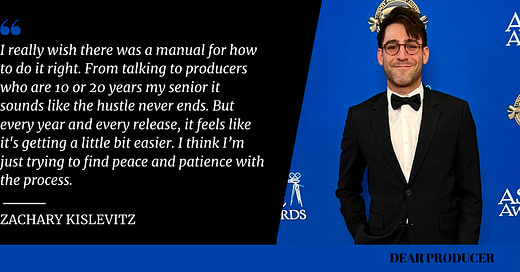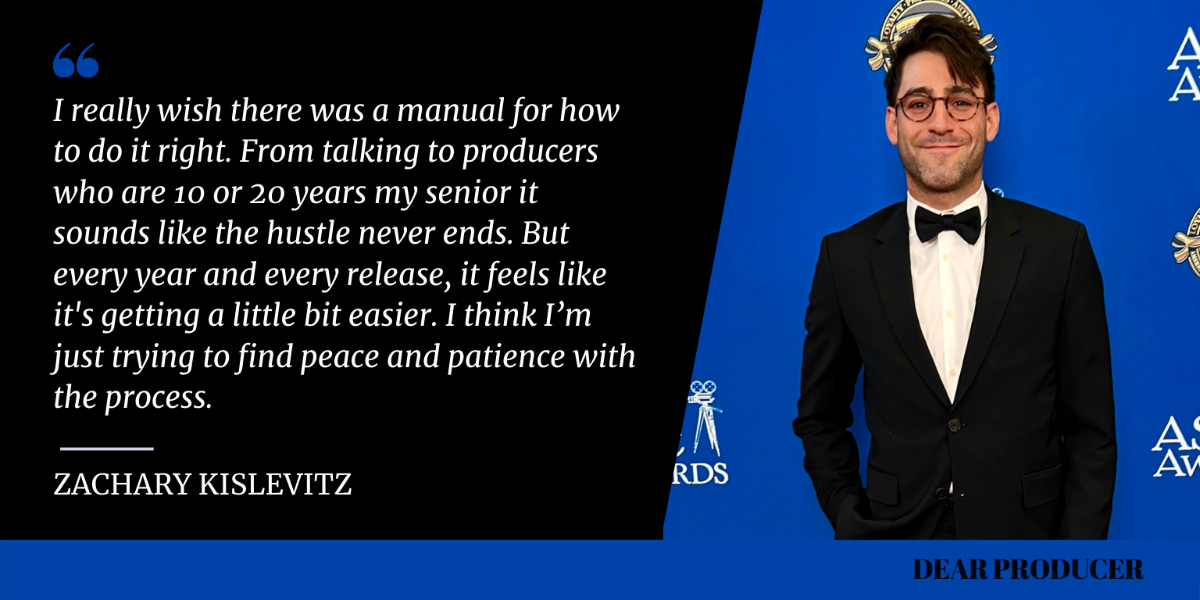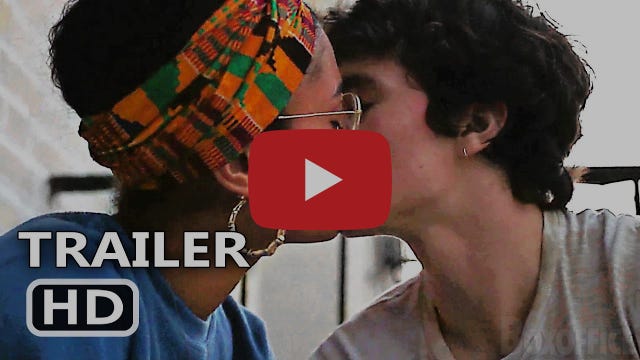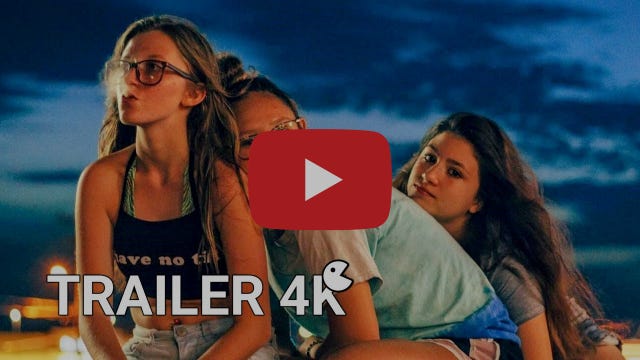Currently in post on Rachel Fleit’s forthcoming documentary for HBO Max, Zachary Kislevitz made the leap to independent producing in 2014 after working in casting and set decorating for production designers in New York City. Kislevitz produced the Scorsese-backed ballroom drama, PORT AUTHORITY, which made history during its world premiere in competition at the 2019 Cannes Film Festival as the first to feature a trans woman of color in a leading role. Kislevitz also produced the 2021 Sundance Film Festival Special Jury Award-winning documentary, CUSP, which was acquired by Showtime and nominated for IDA and ASC Awards.
Kislevitz sat down with Dear Producer to discuss his journey to producing both fiction and documentary projects, the ever-shifting nature of what “documentary” really means, and the road ahead as we all navigate what crafting a sustainable future looks like through uncharted territory.
Becoming a producer has so many different paths, what road did you take?
I think a lot of producers in LA get their start working in agency mailrooms. But I sort of made my own mailroom experience in New York working in Avy Kaufman’s office as a casting intern. I rolled lots of calls and printed headshots – the classic grind, but it was an absolute privilege getting to watch this master do her thing. She really has this remarkable spidey sense for talent. Casting is also such a vulnerable part of the process for directors and I learned a lot from watching her about how to talk with filmmakers about creative ideas. I worked there during college at NYU and then assisted part-time for another year after graduating. The highlight was definitely watching Paul Rudd come in to audition for LINCOLN during a heatwave wearing full civil war regalia.
After that I almost worked on one of the desks in Rudin’s office, but got cold feet hearing rumors of staplers getting flung in the air. I interviewed for a couple other bigger offices in New York, but didn’t get hired. I’m still wondering why I didn’t get those jobs. Maybe I fidget too much for desk life. So I looked for jobs on set where fidgets are welcome and found my people.
My first job was in the art department. I grew up in a family of prop stylists and toy inventors, and since I didn’t go to film school, the only kind of inherited skill I thought I had to offer was set decorating. I started working for designers like Alexandra Schaller and Grace Yun, and had a lot of fun. You haven’t lived until you’ve driven a box truck through Manhattan during rush hour. But I thought the producers were always the coolest people on set. They were like these highly creative business creatures to me that lived between film sets and their iPhones. And for whatever reason I just wanted to be like them. So maybe I found my path because I’m just trying to be cool.
The art department obviously has to be self-sufficient in so many ways, and that experience was ultimately this crash course in scheduling and budgeting, which set me up with the skills to start taking on jobs in production. One shoot led to another, and I ended up coordinating a micro-budget feature that Scott Macaulay was producing, which sort of marked the turning point for me. I realized I really thrived working with all the departments and felt genuinely challenged and excited by helping bring all the different elements together. So I buckled down and started cutting my teeth in physical production.
The great thing about New York is that for such a big city, the indie film scene is relatively small and tightly knit. You get to know a lot of people pretty quickly, and I definitely benefited from serendipity and just plain luck. Eventually, I began line producing for more independent producers I admired like Anne Carey, learning through osmosis as much as I could about this abstract craft and career. Then, sort of in the way that I think has been working out for me so far, I just went for it and didn’t ask for permission when I was ready to produce on my own. I started attaching to projects and developing scripts with filmmakers, leaning on what still feels like hodgepodge experience and intuition. I never had a master plan. Eight years later that’s what I’m starting to figure out now with my company – how to read the industry tea leaves, effectively scale and manage a slate, so there’s enough volume and turnover to offset overhead, and ultimately build more sustainability to just simply be working as an independent producer.
I’ve had so many different careers that got me to producing. In the early 2000s, I was a studio executive and lately have been questioning why didn’t I just stay an executive? The grass is always greener of course… Do you remember the reason you decided to go the indie producer route rather than the executive type job?
I think the underlying reason I decided to go this route at first was because I wanted to have more of a direct hand in finding and facilitating the kinds of stories and artists I believe in and that inspire me personally. And ultimately I wanted the flexibility to do that as well. I think there are very talented execs out there advocating for ‘riskier projects’ and are effective at getting them greenlit, but no matter how much autonomy they have at their company, even if there’s not a dead-set mandate, they always have to work within parameters beyond their control. Whether it’s genre, sales or the artistic taste of their boss. Independent producing is being your own boss and choosing your own adventure. When I was getting going at first it was liberating, but it’s almost become more of a challenge as I look towards growing my company. I’ve had to learn to think more like an exec, ironically. I can personally believe in a lot of stories and a lot of artists, but how can I actually contribute by reaching as many viewers as possible.
Did you set out to do fiction or documentary films, or did you have a fluid approach?
It’s always been filmmaker first for me. I’m much more interested in how artists see the world than the format of their work. And growing up queer with a disabled younger brother, as a producer I’ve predominantly connected with stories that center around underrepresented characters and experiences that I feel are deeply deserving of visibility. I just so happened to get my start producing fiction films, but now I’m finding myself more curious about the space between fiction and documentary. One of the first films I produced, PORT AUTHORITY is a fiction film starring DUNKIRK breakout, Fionn Whitehead, but the director was trained in documentary so we cast mostly non-actors and structured our shoot days so there was as much room as possible to capture improvised performances. It was an earlier career project for me and again there was no master plan, but it sort of was this backdoor introduction to documentary filmmaking that created the aperture for CUSP, which conversely was co-directed by a filmmaker whose background is in fiction. The docs that are the most exciting to me are the ones that I feel are more narrative and character-driven – and the fiction films are the ones that are the most true to reality. I’m also actively developing scripted adaptations of two doc projects I’ve produced. And looking for fiction projects by documentary filmmakers and documentary projects by fiction filmmakers is a hustle for me as well. Where these two worlds collide and intersect has been really satisfying for me creatively. Whether or not it’s the easiest to finance or sell is the gap I’m trying to bridge now as a producer.
When you’re taking on these projects that you know from the start are challenging and not an easy sell, are there specific things you can do to help set them up for success?
[laughs] Yes, but usually in hindsight. I think the key for projects that our industry would deem ‘small’ at first glance is not skimping on meaningful development time to tease out bigger story through-lines or themes and leaning into them as much as possible, without ruining what makes the project special and specific in the first place. At the same time, it’s also a case-by-case basis. I don’t think every film that isn’t broadly appealing should necessarily try to be. There needs to be room for both. Isn’t that literally Netflix’s motto, that they have something for everyone? Ted Sarandos should just buy all of our ‘small’ films.
I’ve gotten a lot of ‘It’s too small.’ throughout my career, especially wanting to tell stories about women. The latest is that ‘It’s not loud enough.’ which is just another way of saying, ‘It’s too small.’
Love that one.
Meaning it’s not big IP, it’s not big talent, etc. Except that I’ve turned the ‘it’s too small’ movie into a big movie. At what point does somebody trust that the thing that seems small to them can be big? I think that that’s where producers are really important in seeing potential.
Yeah I agree. It’s to see that potential early on and to work closely with a director to help thread that needle so financiers and buyers can see it too. I was just going to say, on the flip side I think the challenge for a producer on a project that’s inherently more commercial isn’t to just churn out the product, but to bring your personal taste and sensibility to the process and help elevate the filmmaking.
What I loved about CUSP was that it felt more like a fiction film the way you were following these girls and their lives, not necessarily a straightforward documentary. You were able to insert the camera into so many intimate conversations that the audience would never otherwise be privy to. It was the most intimacy between young girls I think I’ve ever seen on screen and I’m curious what that process was like? How long did it take to get that accessibility in order for them to be so emotionally open?
As soon as I saw the footage that filmmakers Parker Hill and Isabel Bethencourt were capturing in the field, I knew immediately they had something really special on their hands and had to attach. They bootstrapped the first part of production on their own and I came on board to help develop the story, bring on our financier partners, and build out the infrastructure for taking the film to market. We filmed over the course of three years all said and done. But their access to the subjects was instant. Parker and Isabel were on a road trip and met the girls at a gas station at two in the morning and asked to take their photo. The girls invited them to swim with them in a river that same night. I don’t know if you read this in any of the press, but believe it or not, it was shot and the sound was recorded entirely by the two of them. I think that is really what created that intimacy. It was just two open-hearted young women connecting with teenagers becoming young women and creating a space for them to feel seen and heard for the first time in their lives. It’s funny, as I’ve gotten to know the girls too through my own big brother version of a relationship with them, they are exactly who you see in this movie, which is really a testament to Parker and Isabel’s talent as documentary filmmakers and as wonderful people.
I’m curious what your thoughts are on this new wave of celebrity-driven, almost confessional documentaries, like MISS AMERICANA or the Janet Jackson Lifetime special or the Hilary Clinton series. Do you think there should be a different category of documentary at this point when the subject is also a producer?
As a producer with a fiction background, I find conversations around doc ethics to be fascinating. When a subject is also a capital P producer on a project it’s obviously a different kind of documentary than one like CUSP. But I think there’s a range of influence and involvement celebrities have on docs when the subject is also producer. Sometimes it’s just about participating in profit, and other times it’s that collaboration with the director that’s the very thing that creates something really special – like on the Val Kilmer doc. I don’t think we need different categories of documentaries as much as I think we need docs to be invited in best picture and director categories. To me, at the end of the day, all documentary is filmmaking and all filmmaking is subjective. There’s so much room for interpretation and I think what a documentary can be is still really yet to be seen.
You said when you came onto CUSP the directors had already been shooting, you were looking at the footage, and then you started raising money. Did the directors have a lot to prove because there was not a clear financing pathway like there would be in the case of say, a documentary about Taylor Swift?
Taking out a vérité doc compared to a celebrity doc where there’s pop culture interest or a fan base that can really drive sales is night and day. Or an event doc like BOYS STATE where there’s a built-in scope in the concept. What a financier or buyer needs to understand from materials and a filmmaker is totally different in each of those scenarios.I think all good vérité docs take time in the field to build access and trust, find the core idea, and write the story in the edit, which usually doesn’t line up with what the cash flow needs are for the project. When we started raising money for CUSP the directors were just starting to ingest footage from the field into the edit and we had to figure out a lot of what the film was going to be earlier in the edit process than the directors were expecting. Investors wanted to know what the character arcs would be, and we had to show one of them a couple different versions of rough cuts to eventually get their buy-in on the direction.
The other benefit to an event-based doc is there’s a finite end date. If the film is based around a particular event, you at least know by a certain point that the event is over and can articulate a more clear timeline to an investor on when they can expect to receive their money back.
Absolutely. I think the majority of documentary projects, whether they’re vérité or archival, have longer production timelines than fiction. The writing happens in post, which can take at least 10 months if not years. And financing and fees sometimes don’t kick in until there’s a solid rough cut. Fortunately, I work across fiction and documentary, as we talked about, and can supplement income from slower turnover on my doc projects with income from fiction films that are able to get financed once talent attaches and their schedule clears. Event docs definitely benefit from a built-in scope and contained production timeline where investors know what they’re signing up for at the gate. And if docs are your bread and butter, I definitely think producing a combination that includes event-driven projects allows for more sustainability. I’m currently in post on Rachel Fleit’s forthcoming documentary for HBO Max, which on paper is event-driven and will be a 12 month production all-in from concept to delivery – by far the shortest timeline on a documentary I have ever produced.
You said you’re looking at slates and overhead and figuring out how to put together a career from the bird’s eye view of it all. I think so many of us get stuck in a pattern of going project to project, and unfortunately, because we’re working other jobs to pay our bills, we don’t have the space to put together that strategic plan for ourselves. I’m curious how you’re looking at your career in that way.
I don’t want to sugarcoat how hard the financial uncertainty of an independent producing career has been for me. It has been really hard, and I definitely had to work my fair share of side gigs early on as I tried to gain momentum. Producers wear so many hats, and when you look around and see big Hollywood producers with business affairs on retainer, and multiple development execs working across film and TV, it’s impossible to not get jealous when you know how those massive slates are able to sustain themselves with that kind of infrastructure. It can be frustrating to be in a place in your career where you know you could grow your business more quickly if you just had some capital to pay for a support team. The trick for me recently has been diversifying what my slate looks like, expanding into non-fiction and planting seeds on the TV side, and partnering with other producers, so that there’s a little bit more bandwidth outside of the individual projects themselves to dedicate time to strategize and lay that groundwork. But I think as an independent producer no matter what size, the juggle is the same and you’re constantly shifting your slate around and moving projects from the back burner to the front, or deprioritizing development when you’re in production. It’s a constant balancing act. I really wish there was a manual for how to do it right. From talking to producers who are 10 or 20 years my senior it sounds like the hustle never ends. But every year and every release, it feels like it’s getting a little bit easier. I think I’m just trying to find peace and patience with the process.
Not having the infrastructure is really challenging. On the flip side, producers who have that infrastructure often say that the pressure of having staff and being responsible for other people’s livelihoods is intense.
Right. Or you end up just servicing a first-look or overall, and you don’t feel like you’re producing in the same personalized way that you once were, and your job title has literally evolved into something entirely different than what the goal was for seeking that kind of deal in the first place.
Producing is a very inconsistent and unstable job. If you’re someone who’s not okay with not knowing what you’re doing in a couple of months, it’s not the job for you.
[laughs] And I still struggle with that reality. I would really love to know when I can take a vacation next and plan for it six months out like a normal human being. I’m kind of envious of my non-industry friends that can actually plan their adult lives. Since I’ve started producing, I’ve always had to say when asked to make plans that ‘it depends on whether this shoot is going to go or not.’
This is a big question, but what are your thoughts on independent film and its future? I’m curious to hear your take on where indie film fits in the world.
[laughs] Can I decline to comment? I oscillate between optimism and cynicism around this question daily. I’ll just start off by saying DVD sales is still an outdated clause in my most recent deals. Why? I do not know. Listen, I think true independence is ephemeral. The moment artists create something radical the system swoops in to commodify and the magic slips away. You’re constantly chasing independence. I don’t know what it will look like in the future. Like every ‘90s kid, I mourn the loss of Blockbuster and I’m worried that the new streaming world won’t include a sustainable model for indie film. But I’ve seen flowers grow in sidewalk cracks, so I guess I’m a romantic and trust that great stories by great artists can win in the end.
I don’t know if you’re a Courtney Barnett fan, but I’ve been thinking a lot about the title of her latest album, which is Things Take Time, Take Time. I think we’re in a moment where so much change is happening so quickly, there’s a sense of riding it out a little bit, but I believe real change is coming when it comes to building a sustainable model, it’s just going to take a little more time.
If you are enjoying and benefiting from the stories we are publishing, please consider making a donation to ensure that we can continue to provide free resources for filmmakers and amplify the voices of producers.







